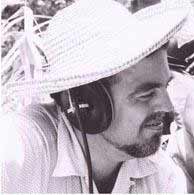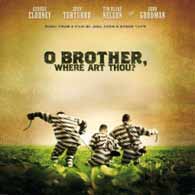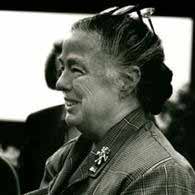VOICE ONE:
Welcome to THIS IS AMERICA in VOA Special English. I'm Doug Johnson.
VOICE TWO:
And I'm Barbara Klein. This week on our program, we finish the story of the Lomax family. They were an influential family of musical folklorists.
(MUSIC)
VOICE ONE:

We talked last week about John Avery Lomax and his work collecting American folk songs. He collected thousands of songs in the 1920s, 30s and 40s to save for future generations. His son Alan soon joined him, and continued collecting music after his father died in 1948.
Like his father, Alan Lomax went to work for the Library of Congress, where he directed the Folk Archive. He also produced a series of radio programs on American folk music. And he wrote one of the most influential books on early jazz, "Mister Jelly Roll." It was the result of hours of recorded discussions with New Orleans jazz great Jelly Roll Morton.
(MUSIC)
In the 1950s Alan Lomax published a series of books about world folk music. Later, he won a National Book Critics Circle award for "The Land Where the Blues Began," published in 1993.
He received the National Medal of Arts from President Ronald Reagan and a Library of Congress Living Legend Award. The recording industry honored his lifetime work with a Grammy Award after he died in 2002.

Songs from his collections were used in the movie "O Brother, Where Art Thou?" Here is a song called "Po' Lazarus."
(MUSIC)
VOICE TWO:
Dick Weissman is author of the book "Which Side Are You On? An Inside History of the Folk Music Revival in America." In it, he says it was the usual practice for folklorists to copyright songs that they collected. The copyright holder owns the rights to the song for a period governed by law.
In the 1940s and 50s, the publisher and songwriter equally shared income from record sales. That could include people like the Lomaxes who copyrighted a new arrangement of an old folk song.
Some of the songs collected by the Lomaxes became popular records. For example, Lead Belly's "Good Night, Irene" became a huge hit for the folk group the Weavers. That was in 1949, a year after John Lomax died.
The copyrights to these songs were held not only by the singers but also by his son Alan. Other musicians like Harry Belafonte and the Kingston Trio also recorded songs for which Alan Lomax shared in the copyright.
VOICE ONE:
Some observers have criticized Alan Lomax and his father for earning money from the traditional music they collected, including from black musicians in the South.
Ted Gioia is author of "Delta Blues: The Life and Times of the Mississippi Masters Who Revolutionized American Music."
One example he uses in his 2008 book is Huddie Ledbetter, the singer and guitarist known as Lead Belly. The author says Lead Belly's contract with the Lomaxes' prevented him from being represented by anyone else for five years.
In the 1950s Alan Lomax traveled to Europe where he collected folk music. Ted Gioia says the folklorist largely paid for his travels with royalty money from the Weavers' recording of "Good Night, Irene."
The author notes that Alan Lomax apparently claimed composer credit on about 800 songs. But to be fair, he says the Lomaxes did nothing illegal -- they were not the only ones holding copyrights to folk songs. Many performers who have recorded traditional material have listed themselves as the composer.
Still, Ted Gioia calls Alan Lomax the self-appointed "custodian of America's music traditions." He also points to his position with the Library of Congress. The author argues that the folklorist should have aimed for "a higher standard of ethics in such matters."
(MUSIC)
VOICE TWO:
The Lomax family's involvement with folk music also included John Lomax's youngest child, Bess. Bess Lomax helped her father with his folk music collection.
In the 1940s, she joined the Almanac Singers. The group was active in the social protest and union movements of the time.
Different members came and went from the Almanac Singers. They included Bess' brother Alan as well as Woody Guthrie, Pete Seeger and Baldwin "Butch" Hawes, who became her husband.
Here she sings a song called "I Never Will Marry."
(MUSIC)
VOICE ONE:
In 1949 she and Jacqueline Steiner wrote new words to an old song. It became a campaign song for Walter O'Brien, a Progressive Party candidate for mayor of Boston, Massachusetts. One of his promises was to fight a fare increase on what was known as the M.T.A. subway system.
In the song, a man named Charlie has to ride forever because he does not have enough money to leave the train. Here are Bess Lomax, Woody Guthrie and Pete Seeger:
(MUSIC)
Walter O'Brien lost the race. But the song became a lasting hit with a version recorded in 1959 by the Kingston Trio.
(MUSIC)
VOICE TWO:

Bess Lomax Hawes later taught music and became an anthropology professor in California. In the 1970s, she worked at the Smithsonian Institution in Washington. She went on to direct the folk arts program at the National Endowment for the Arts. In 1993 President Bill Clinton awarded her the National Medal of Arts. She died in 2009.
VOICE ONE:
Dan Sheehy at the Smithsonian Center for Folklife and Cultural Heritage says the influence of the Lomax family can still be felt. And not just with music, but also other areas of culture. Modern folklorists use new technology like social media and the Internet to do their work, Dan Sheehy says. But they continue to pursue a goal set by the Lomaxes.
DANIEL SHEEHY: "Following Alan Lomax's philosophy that he sometimes called 'cultural equity.' That is, seeing what we didn't see on television. What we didn't see on the big stages. What we didn't hear on the radio and on major recordings. And finding ways to help those voices, those songs, those stories, those craft traditions make it into the lives of a much broader public."
(MUSIC)
VOICE TWO:
Our program was written by Nancy Steinbach and produced by Caty Weaver. I'm Barbara Klein.
VOICE ONE:
And I'm Doug Johnson. You can hear the first part of our program about the Lomax family at voaspecialenglish.com. You can also post comments and subscribe to podcasts. Join us again next week for THIS IS AMERICA in VOA Special English.
How a family helped save American folk music
Bess Lomax Hawes, 88, brought folk music to a wider public
From traditional to 'freak,' the evolution in American folk music
Folklife Festival takes visitors to the ancient country of Wales
(來(lái)源:VOA 編輯:陳丹妮)
